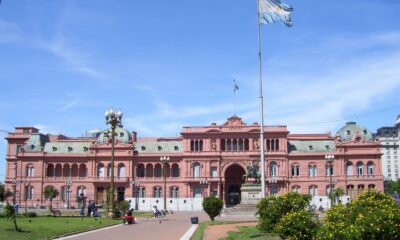Fintech
Argentine Fintech Chamber Warns on $Libra Scam, Urges Crypto Regulation and Transparency
The Argentine Fintech Chamber issued a statement after the $Libra scam, emphasizing crypto’s potential while urging transparency and regulation. It highlighted Argentina’s leadership in crypto adoption and stressed the importance of security, financial inclusion, tokenization, investment, and smart contracts. Bitso’s CEO criticized Milei’s promotion of unverified projects and called for industry regulation.

The Argentine Fintech Chamber, which brings together companies in the ecosystem of digital financial activities and includes in its management structure executives from companies such as Mercado Libre and Ualá, digital wallets such as Bitson and various technology developers in the crypto ecosystem, issued a statement following the scandal and scam with the token or memecoin $Libra, consummated after president Javier Milei promoted it in a post on social networks, which he deleted five hours later, when the scam had already been consummated.
“The value of crypto for the development and modernization of Argentina” is the title of the statement, which emphasizes the “transformative potential” and reaffirms the sector’s commitment “to the development of a solid, reliable and growth-oriented crypto industry in the country.”
The Argentine Fintech Chamber Addresses $Libra Scam
“In the context of what has happened in recent hours with $LIBRA and the reports of a rug pull case, it is key to differentiate cases like this from the real value that crypto technology brings to the productive and financial development of Argentina,” says the statement by the Argentine Fintech Chamber , which highlights that Argentina is one of the global leaders in the adoption of cryptoassets and blockchain, with more than 2.5 million active monthly users of crypto wallets and a transaction volume that in 2024 exceeded $91.1 billion.
“This leading position represents a unique opportunity for the country to consolidate itself as a regional and global leader in the digital economy,” said the Argentine Fintech Chamber. But to take full advantage of this potential, it continues, “it is essential to operate within a framework of transparency and security. For this reason, we emphasize the importance of using platforms registered and supervised by the National Securities Commission (CNV), and we reiterate our willingness to collaborate with public authorities to build policies that promote innovation and protect users.”
According to the Argentine Fintech Chamber, the “transformative potential” of the ecosystem translates into four concrete applications, namely:
𝟭.Protection and financial inclusion: Via stablecoins and virtual assets that allow millions of Argentine individuals and SMEs to “preserve the value of their income and access previously inaccessible investment instruments.” These are tools, he stressed, “that integrate sectors that have historically been excluded from the traditional financial system.”
𝟮. Tokenization of physical and financial assets (real estate, commodities, crops) generates liquidity, reduces operating costs and opens new avenues for financing. For example, the statement says, “Argentine agriculture could tokenize its production and obtain financing of up to USD 50 billion annually.”
𝟯.Impuls inversion: According to the Fintech Chamber, the Argentine crypto ecosystem “is a reference in Latin America and attracts global capital and talent”, which is why promoting it “implies generating more specialized employment and professional development opportunities”.
𝟰. Smart contracts and intermediaries: In this regard, the statement explains that “smart contracts” eliminate intermediaries in sectors such as agriculture, logistics and foreign trade, “reducing costs, speeding up operations and providing greater transparency to the processes”.
“Argentina is facing a historic opportunity to lead the way towards a modern, efficient and inclusive digital economy,” concludes the message from the Argentine Fintech Chamber, which reaffirms its “commitment to work alongside the public and private sectors on an agenda to make crypto a tool for progress and sustained growth for the country.”
Earlier, Julián Colombo , general director of Bitso Argentina, a regional digital wallet, had highlighted some aspects of the $Libra case.
“The first is the role of a president promoting cryptocurrency projects that do not have some of the blockchain sanity checks that we, who are in the ecosystem, always analyze. For example, a crypto where the vast majority of tokens are held by a single wallet, which in the course of 3 hours moves more than $1 billion and suddenly disappears. When you do an analysis, you see that a single wallet made a profit of more than $85 million. This is interesting to analyze.”
Secondly, Colombo said, Bitso and other companies in the sector “always advocate for a regulated industry; in fact, not only we, but many of the companies in the ecosystem have been working for many years with the National Securities Commission (CNV), the Central Bank, the UIF, and the AFIP (now ARCA) to be able to adapt to the regulatory mechanisms we have in Argentina and be companies that provide protection to users.”
In this way, he explained, “if something suddenly happens with your cryptocurrencies, there is someone who is responsible, there is a company behind it. That is why it hurts us that these episodes only serve to once again talk about crypto as a scam, that once again people talk about the negative aspects of crypto, when crypto is very useful, it offers many advantages not only for Argentines, but for people from any country in the world, something that we have been observing for many years.”
Colombo regretted that the regulated companies in the ecosystem have not yet been able to meet with President Milei. “We are waiting, because we saw that he met with other representatives that we do not know, that we do not know where they came from; we would love for him to meet with the representatives who have been working for so long for this regulated industry,” emphasized Colombo, who advised users to “do a minimum of research on the assets in which they are going to place their money when they make an investment (…) it is not the same to buy a stablecoin or digital dollar than bitcoin or a memecoin. I think it is essential.”
The Argentine Fintech Chamber is chaired by Mario López, from Poincenot Technology Studios, and has Paula Arregui, from Mercado Libre, as its “First Vice President.” The Board of Directors includes executives from companies such as Ualá, Bitson, Lemon, Naranja X, Ripio, Personal Pay and many more.”
__
(Featured image by Gustavo Sanchez via Unsplash)
DISCLAIMER: This article was written by a third party contributor and does not reflect the opinion of Born2Invest, its management, staff or its associates. Please review our disclaimer for more information.
This article may include forward-looking statements. These forward-looking statements generally are identified by the words “believe,” “project,” “estimate,” “become,” “plan,” “will,” and similar expressions. These forward-looking statements involve known and unknown risks as well as uncertainties, including those discussed in the following cautionary statements and elsewhere in this article and on this site. Although the Company may believe that its expectations are based on reasonable assumptions, the actual results that the Company may achieve may differ materially from any forward-looking statements, which reflect the opinions of the management of the Company only as of the date hereof. Additionally, please make sure to read these important disclosures.
First published in infobae. A third-party contributor translated and adapted the article from the original. In case of discrepancy, the original will prevail.
Although we made reasonable efforts to provide accurate translations, some parts may be incorrect. Born2Invest assumes no responsibility for errors, omissions or ambiguities in the translations provided on this website. Any person or entity relying on translated content does so at their own risk. Born2Invest is not responsible for losses caused by such reliance on the accuracy or reliability of translated information. If you wish to report an error or inaccuracy in the translation, we encourage you to contact us

-

 Markets6 days ago
Markets6 days agoRising U.S. Debt and Growing Financial Risks
-

 Business2 weeks ago
Business2 weeks agoDow Jones Near Record Highs Amid Bullish Momentum and Bearish Long-Term Fears
-

 Africa3 days ago
Africa3 days agoCameroon’s Government Payment Delays Exceed 200 Days, Straining Businesses and Public Finances
-

 Crowdfunding1 week ago
Crowdfunding1 week agoThe Youth Program at Enzian Shooting Club Is Expanding Thanks to Crowdfunding



















